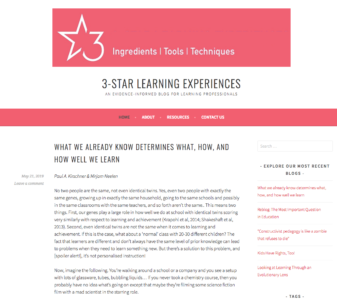EdTech Myths and Truths: An Interview with EdMedia Keynote Speaker Paul Kirschner (Open University, The Netherlands)
The upcoming EdMedia conference will be held from June 24-28 in Amsterdam. The program contains five keynotes as part of the conference. Keynotes are a great way to connect with experts in the field and learn about current, cutting-edge research. Prof. dr. Paul A. Kirschner, dr.h.c. is giving a keynote on how cognitive science and educational psychology research can inform the use of digital media for teaching and learning. His keynote will take place on Monday, June 24.
Don’ts and Do’s for ICT in Teaching and Learning: What Does the Research Say?
Paul Kirschner, Open University, The Netherlands

Paul Kirschner, Open University of The Netherlands
Abstract : Mark Twain once said that “In religion and politics, people’s beliefs and convictions are in almost every case gotten at second hand and without examination”. Unfortunately this is also true in present day education, especially with respect to the use of multimedia (MM) and other information and communication technologies (ICTs). We see this not only in schools and universities, but also in teacher education and teacher training. Educational technologists, educational reformers, instructional designers, local and federal politicians, teachers, school managers, and advisory groups are all jockeying to show how innovative and up to date they can be, based not upon good science but rather upon commonly held but often unproven and/or untrue beliefs. As a result, we spend a lot of time. effort and money implementing so-called innovations in education making use of MM and ICTs while there is often little to no scientific research to support what is being done. And what is the root of all of this? What we see being implemented in schools and universities is most often not based on good science (and specifically the cognitive and educational psychological sciences) and/or good scientific research, but rather upon beliefs, plausible sounding rationale and/or arguments often propagated by educational gurus with little knowledge of education and teaching, and poorly designed research. We will look at a number of these myths from the perspective of what cognitive science and good research in the field has to say about them and will also offer suggestions as to what we should do.
Interview
In the interview for AACE Review, Paul Kirschner talks about the future of research for ICTs and multimedia, as well as some of the main talking points of his keynote.
What do you see as the future of research for the use of multimedia and other information and communication technologies in teaching and learning?
Multimedia and other ICTs should be studied as tools in teaching and learning as they are nothing more and nothing less than that. In this respect they don’t differ from any other tools that a teacher can use to make her/his job more effective, efficient, and/or enjoyable.
Can you explain what it means to make learning more effective? Does learning become easier for lazy learners with the right learning design?
When I speak of a learning experience being effective, I mean that the learner will learn what (s)he needs to learn in the time allotted to the learning experience. If we want to make a learning experience more effective, then we want the person to learn more in the time allotted or to learn what needs to be learnt more deeply. When I speak of an efficient learning experience, I mean that what is learnt is learnt in less time or with less (mental) effort. By increasing an experience’s efficiency, we create, on the one hand, more time for the learner to practice and, thus, learn more and better. On the other hand, by decreasing the mental effort that needs to be spent on learning, we free up the learner’s cognitive resources for learning more deeply. The goal is not to make it easy (i.e., with as little effort as possible), but rather to efficiently use the effort spent to learn better.
What does an enjoyable learning experience look like? Can an effective design make learning fun?
Again, this is where some misunderstanding occurs: When I speak of making the learning experience more enjoyable I emphatically don’t mean making learning fun. Of course, it would be really nice if we could make learning fun, and I’m not opposed to this, but learning is hard. Learning takes a lot of time and effort (e.g., to practice) and this practice most often isn’t fun. It’s hard work, takes a lot of time, and can often be frustrating! What I do mean is that we need to design learning experiences in ways that the learner experiences success / a feeling of accomplishment at each stage of the learning process. We want the self-efficacy of the learner – the feeling that (s)he is able to successfully do something – to increase, and thus increase the motivation to continue to learn.
Do motivated learners learn better?
There’s a common misconception of the relationship between motivation and learning. While there is definitely a correlation between the two, many think that this is also causal in that motivation will lead to learning or that there is a reciprocal relation between the two in that motivation will lead to learning AND that leaning will lead to motivation. The problem is that both are wrong. The actual relationship is that learning leads to motivation. Experiencing success leads to the motivation to continue learning while experiencing failure demotivates.
Yu described multimedia and ICT as simple teaching tools. Do they have specific properties to make learning efficient or enjoyable?
They don’t differ from other tools that learners have at their disposal to make learning more effective, efficient, and/or enjoyable. As Richard Clark wrote: “The best current evidence is that media are mere vehicles that deliver instruction but do not influence student achievement any more than the truck that delivers our groceries causes changes in our nutrition”. They can make the delivery less expensive or deliver more quickly, and so forth but that’s it.
You are professor of educational psychology at the Open University of the Netherlands as well as visiting professor of education at the University of Oulu, Finland. What do you enjoy most about your position?
Two things: (1) making a contribution to helping learners learn better and (2) working with master students and PhD candidates in helping them grow to become good educational researchers.
What are some of the main myths surrounding innovation in technology today?
- That media and ICTs actually do more than just deliver instruction
- That people can multitask
- That knowledge is no longer important because it’s all on the Internet
- That technology will revolutionise learning and teaching
- That digital natives (Prensky) and homos zappiëns (Veen) actually exist
- That access to computers is all that’s necessary to learn (Mithra – Hole in the wall)
What key insights do you hope attendees will take away from your keynote?
That they are critical about and positively skeptical towards claims about media and ICTs in education.
About
Biography: Paul A. Kirschner (1951) is Distinguished University Professor and professor of Educational Psychology at the Open University of the Netherlands as well as Visiting Professor of Education with a special emphasis on Learning and Interaction in Teacher Education at the University of Oulu, Finland where he was also honoured with an Honorary Doctorate (doctor honoris causa). He is an internationally recognised expert in the fields of educational psychology and instructional design. He is Research Fellow of the American Educational Research Association and the Netherlands Institute for Advanced Study in the Humanities and Social Science. He was President of the International Society for the Learning Sciences (ISLS) in 2010-2011, member of both the ISLS CSCL Board and the Executive Committee of the Society and he is an AERA Research Fellow (the first European to receive this honour). He is currently a member of the Scientific Technical Council of the Foundation for University Computing Facilities (SURF WTR) in the Netherlands and was a member of the Dutch Educational Council and, as such, was advisor to the Minister of Education (2000-2004). He is chief editor of the Journal of Computer Assisted Learning, commissioning editor of Computers in Human Behavior, and has published two very successful books: Ten Steps to Complex Learning (now in its third revised edition and translated/published in Korea and China) and Urban Legends about Learning and Education (also in Dutch, Swedish, and Chinese). He also co-edited two other books (Visualizing Argumentation and What we know about CSCL). His areas of expertise include interaction in learning, collaboration for learning (computer supported collaborative learning), and regulation of learning.
Further Information
 The Blog “3-Star Learning Experiences: An Evidence-Informed Blog for Learning Professionals” is authored by Paul Kirschner and Mirjam Neelen. The blog aims to present learning professionals with evidence-informed ideas on how to make both the instructional and the learning experience more effective, efficient, and enjoyable.
The Blog “3-Star Learning Experiences: An Evidence-Informed Blog for Learning Professionals” is authored by Paul Kirschner and Mirjam Neelen. The blog aims to present learning professionals with evidence-informed ideas on how to make both the instructional and the learning experience more effective, efficient, and enjoyable.

winning powerball
November 20, 2019 at 2:15 pm
Thanks for the sensible critique. Me and my neighbor were just preparing to do some
research on this. We got a grab a book from our area library but I think I learned more from
this post. I’m very glad to see such great info being shared freely out there.